"What is wrong with her?"
This is what a classmate of my eldest child asked, regarding B. It caught me by surprise. For one, over the year, A's class has seen her little sister. They've also heard my daughter speak about her. So, I assumed all the kids understood: she's different. I guess not. Perhaps hearing stories or explanations, and seeing a child in the special ed group is one thing. Actually spending time with and being near to that child is another.
B has great difficulty in new settings. She has a very hard time with new people, especially children. On the day this question was posed, my little one was having to tackle both. We were in a semi-strange classroom (her sister's room, which B has been to only briefly twice before) and, of course, it was full of children. The visit began with anxiety and tears, B not wanting to go in the room. However, I had to be there in the room to help out. I reassured her, and we made it into the room without anymore difficulty.
Her sister swiftly found crayons and paper for coloring (did I mention A is the greatest big sis ever?!). We sat at the teacher's desk, and she colored. The children were busy with a quiet activity themselves. The boy sitting closest to us attempted to converse with B. "Does she talk?" he asked, after getting no response from her. "Yes," I said. Indeed, she is verbal (very silent in situations such as these though). The boy continued to say "hi" and tried to get a response from her. She burrowed herself into my chest (something that becomes harder and harder as she grows and gets bigger). I told B she could wave if she didn't want to say hello, she did neither. The boy eventually got bored and went back to his work.
A while later, she was done with coloring. We walked over to the book corner. B was very hesitant, not wanting to be exposed out there, in front of the class, in front of those children. She clung to me, and we carefully made it to where the books were kept. As we were picking out a book, that's when I heard "what's wrong with her?" The little girl asked, half concerned, half aggravated. I can't pinpoint what made her ask this question. So many of B's mannerisms are now normal to me; I have a hard time deciphering what is deemed abnormal by others. Was it because she wasn't speaking? Because she stared down at the ground, never looking at the class? Was it her whimpering? Perhaps she was stimming, or was it something else?
I guess I was caught off-guard because at the time, as far as I could tell, she wasn't doing anything overly exaggerated. She wasn't having a meltdown, she wasn't rocking, flapping, or walking in circles, she wasn't shrieking or doing anything else that would make her appear obviously different. And yet, an elementary student picked up on the fact that something was different about my little girl.
I was perplexed and bothered by the question. I had assumed that these kids understood her. Sounds silly to me now, to expect that from children. I also thought that in her quiet moments, B blended (not that it's some goal of ours, just an assumption of mine). I'd even heard from people here and there when she was younger, that at first glance, they'd "never even know anything was wrong with her." I didn't have an explanation for the inquisitive girl. I told her that B was okay, and for her to get back to her classwork.
"What's wrong with her?" It echoed in my mind and really bothered me. I felt sad for my daughter. I've felt this before. The times people have asked "why does she do that?" or "what is she doing?" And when other children have given her odd looks. I've even heard kids ask A about her sister, "why doesn't she speak?" A common response is "she's very shy" or "she's really excited." It's easier to say that, to people who you'll never see again and when you've only a moment to speak. If I do have more time, I have explained autism, sensory issues, feeding tubes, etc. I certainly didn't know how to give a child an answer to this particular question.
And, in this moment, I realized this was only the beginning. In the last year or so, the differences between B and her peers have become more obvious. The questions, the looks, the curiosity of others increases. Aside from the social, sensory, and other issues, her motor skills are pretty delayed. So, even when simply playing at the park, my child struggles. Well, I see her struggle. To B, it's just her body--it's how it's always worked, she knows nothing else. So, I don't know if I can say "she struggles." She has to work a lot harder, falls a lot more, and isn't able to do some things that kids her age can do. But again, it's not like she sits there thinking "if only I could..." as she never has. I don't know what level of self-awareness B has (if it's any less than other kids her age or not), but she isn't very interested in most other children (especially those she doesn't know--like the ones at the playground, she has a very hard time interacting and even observing them). So at this point, I don't think she worries about what her peers are capable of doing versus what she can do.
I suppose the other reason why this simple, even innocent, question affected me more than I would have expected, was because I didn't want my daughter to hear it. As with her gross motor delays, I'm not sure how these comments affect her. A part of me hopes she doesn't care about that sort of thing, that what other people think just doesn't matter to her. But what if she does? I certainly wouldn't like it if I heard "what's wrong with her?" or "why is she like that?" and so on, wherever I went. It would surely, at the very least, damper my self-esteem. I hope my child doesn't understand what's implied in these questions. Hopefully, she is busy thinking of better things and focused elsewhere when these comments are made. In time, I imagine I will learn if and what B hears, if she cares, and how it may be affecting her.
Until then, a girl's simple question leaves me with more questions of my own.
5/14/08
The Question That Led To Many Questions...
Labels:
Acceptance,
My Autism Everyday,
The Future
Subscribe to:
Post Comments (Atom)
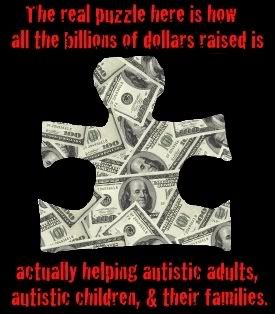







 This Way of Life
This Way of Life



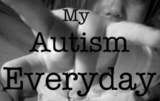





 "Autism is a way of being. It is pervasive; it colors every experience, every sensation, perception, thought, emotion, and encounter, every aspect of existence. It is not possible to separate the autism from the person."
- Jim Sinclair
"Autism is a way of being. It is pervasive; it colors every experience, every sensation, perception, thought, emotion, and encounter, every aspect of existence. It is not possible to separate the autism from the person."
- Jim Sinclair


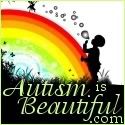






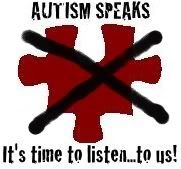












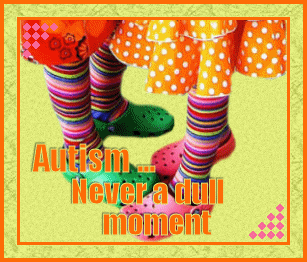

1 comment:
That negative charge of "What's wrong with her" really packs a wallop, right?
I have been in similar situations while my (now homeschooled) son was still attending regular class in public school. Cynical part of me would ocassionally wonder why NT kids with supposedly unimpaired social skills and firm grasp of the theory of mind still have the inclination to make the person feel absolutely rotten.
And then there was my son with (as one of his teachers found fit to put it) "almost no grasp of social skills" who would regularly spend his recess playing with ostracized kids from special education classroom, most of them with Down's. He would never dream of asking what is wrong with them - for him, they were simply kids and only difference he would see is that they were usually nice towards him (unlike most of his NT classmates). If there is one moment I cherish out of our rather miserable public education experience, it is the one where special education class teacher tells me how D. is always nice towards her children and very kind young man.
Post a Comment